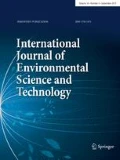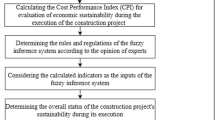Abstract
Urban sustainability can be considered as a part of sustainable development, which emphasizes the balance between three dimensions of environmental, economic, and social sustainability to improve human well-being and the quality of life. In this study, it was attempted to assess urban sustainability in the most critical, populous, and expanded district of Tehran (district 4) using sustainability assessment by fuzzy evaluation. For this purpose, 52 primary indices which were divided into 8 secondary components were employed. Among them, 18 indices for environmental issues were grouped into three secondary indices as E1, to E3, and 34 indices for economic–social and cultural issues were classified into five secondary indices as H1 to H5. The results revealed that 56% of the study area was potentially unsustainable and 44% of it had a medium sustainability in terms of environmental aspects. Furthermore, 65% of the study area had a medium human well-being sustainability and 35% of it was potentially unsustainable in terms of economic–social and cultural aspects. Finally, 45% of the study area was found unsuitable in terms of overall urban sustainability. The functional sample proposed in the present study can provide the directors and planners with the required information about the condition of sustainability in the most important district of Tehran.






Source: Iranian Statistics and Information Agency, Tehran Municipality District 4 (Deputy of Urban and Environmental Services, Traffic and Transportation, Social and Cultural Affairs), and the Studies and Planning Center of Tehran Municipality












Similar content being viewed by others
References
Ahmad S, Wong K, Zaman B (2019) A comprehensive and integrated stochastic-fuzzy method for sustainability assessment in the Malaysian food manufacturing industry. Sustainability 11(4):948
An D, Xi B, Ren J, Ren X, Zhang W, Wang Y, Dong L (2018) Multi-criteria sustainability assessment of urban sludge treatment technologies: method and case study. Resour Conserv Recycl 128:546–554
Andria J, di Tollo G, Pesenti R (2019) Fuzzy multi-criteria decision-making: an entropy-based approach to assess tourism sustainability. Tour Econ. https://doi.org/10.1177/1354816619885207
Andrianos L (2015) Fuzzy evaluation of progress towards sustainable development: the need for environmental ethics and eco-religions revival. Environ Ecol Res 3(4):108–118
Andriantiatsaholiniaina L, Kouikoglou V, Phillis Y (2004) Evaluating strategies for sustainable development: fuzzy logic reasoning and sensitivity analysis. Ecol Econ 48(2):149–172
Arushanyan Y, Ekener E, Moberg Å (2017) Sustainability assessment framework for scenarios—SAFS. Environ Impact Assess Rev 63:23–34
Arcadis (2019) Citizen Centric Cities: 2019 Arcadis sustainable cities index. Retrieved, https://www.arcadis.com/en/global/our-perspectives/sustainable-cities-index-2018/citizen-centric-cities/. Accessed 9 Sept 2019
Assunção ERGTR, Ferreira FAF, Meidutė-Kavaliauskienė I, Zopounidis C, Pereira LF, Correia RJC (2020) Rethinking urban sustainability using fuzzy cognitive mapping and system dynamics. Int J Sustain Dev World Ecol 27:1–15
Atlas.tehran.ir (2019) International position of Tehran metropolis. Available at: http://atlas.tehran.ir/Default.aspx?tabid=181. Accessed 30 Nov 2019
Bugliarello G (2010) The future of urban sustainability: Some urgent sociotechnological challenges. Sustainability 3:351–358. https://doi.org/10.1089/SUS.2010.9730
Cao Y, Wang S, Yi L, Zhou J (2016) A social sustainability assessment model for manufacturing systems based on ergonomics and fuzzy inference system. In: Setchi R, Howlett R, Liu Y, Theobald P (eds) Sustainable design and manufacturing 2016. SDM 2016. Smart innovation, systems and technologies, vol 52. Springer, Cham. https://doi.org/10.1007/978-3-319-32098-4_54
Cash DW, Clark WC, Alcock F, Dickson NM, Eckley N, Guston DH, Jäger J, Mitchell RB (2003) Knowledge systems for sustainable development. Proc Natl Acad Sci U S A 100(14):8086–8091
Cavallaro F (2015) A Takagi-Sugeno fuzzy inference system for developing a sustainability index of biomass. Sustainability 7(9):12359–12371
Chanapathi T, Thatikonda S, Pandey VP, Shrestha S (2019) Fuzzy-based approach for evaluating groundwater sustainability of Asian cities. Sustain Cities Soc 44:321–331. https://doi.org/10.1016/j.scs.2018.09.027
Cheng R, Li W (2019) Evaluating environmental sustainability of an urban industrial plan under the three-line environmental governance policy in China. J Environ Manag 251:109545
Chhipi-Shrestha G, Hewage K, Sadiq R (2017) Selecting sustainability indicators for small to medium sized urban water systems using fuzzy-ELECTRE. Water Environ Res 89(3):238–249
Dang VT, Wang J, Van-Thac Dang W (2019) An integrated fuzzy AHP and fuzzy TOPSIS approach to assess sustainable urban development in an emerging economy. Int J Environ Res Public Health 16(16):2902
de Campos Filho OR, Lima WG, Paiva de Oliveira RFA (2019) Smart sustainable cities: using a fuzzy inference system to determine their global score. Glob J Sci Front Res. https://doi.org/10.34257/gjsfrhvol19is1pg1
Dumane PR, Sarate AD, Chavan SS (2019) Sustainability assessment by use of fuzzy logic—a review. In: Iyer B, Nalbalwar S, Pathak N (eds) Computing, communication and signal processing. Advances in intelligent systems and computing, vol 810. Springer, Singapore
Ec.europa.eu (2019) Sustainable development—environment—European commission. Available at: https://ec.europa.eu/environment/sustainable-development/index_en.htm. Accessed 5 Oct 2019
Elmqvist T, Fragkias M, Goodness J, Güneralp B, Marcotullio PJ, McDonald RI, Parnell S, Schewenius M, Sendstad M, Seto KC, Wilkinson C (eds) (2013) Urbanization, biodiversity and ecosystem services: challenges and opportunities. Springer, Dordrecht
En.tehran.ir (2019) Tehran international-sister and friend cities. Available at: http://en.tehran.ir/Default.aspx?tabid=95. Accessed 5 Oct 2019
Fan M, Zhang Z, Wang C (2019) Optimization of annual generator maintenance scheduling. In: Mathematical models and algorithms for power system optimization, pp 49–80
Flour P, Makoondlall-Chadee T, Bokhoree C, Mohee R (2014) Structured fuzzy based methodological approach towards sustainability performance assessment. Int J Environ Sci Dev. https://doi.org/10.7763/ijesd.2014.v5.482
Global Platform for Sustainable Cities, World Bank (2018) Urban sustainability framework, 1st edn. World Bank, Washington
Guijt I, Moiseev A, Prescott-Allen R (2001) IUCN resource kit for sustainability assessment. IUCN-The World Conservation Union, Gland
Haider H, Hewage K, Umer A, Ruparathna R, Chhipi-Shrestha G, Culver K, Holland M, Kay J, Sadiq R (2018) Sustainability assessment framework for small-sized urban neighbourhoods: an application of fuzzy synthetic evaluation. Sustain Cities Soc 36:21–32
Hamarsheh Q (2020) Neural networks and fuzzy logic. Philadelphia.edu.jo. Available at: https://www.philadelphia.edu.jo/academics/qhamarsheh/page.php?id=35. Accessed 8 Nov 2020
Hatefi SM, Tamošaitiene J (2018) Construction projects assessment based on the sustainable development criteria by an integrated fuzzy AHP and improved GRA model. Sustain (Switz) 10(4):991
Hincu D (2011) Modelling the urban sustainable development by using fuzzy sets. Theor Empir Res Urban Manag 6:88–103
Huang L, Wu J, Yan L (2015) Defining and measuring urban sustainability: a review of indices. Landsc Ecol 30(7):1175–1193
Jaderi F, Ibrahim ZZ, Jaafarzadeh N, Abdullah R, Shamsudin MN, Yavari AR, Nabavi SMB (2014) Methodology for modeling of city sustainable development based on fuzzy logic: a practical case. J Integr Environ Sci 11(1):71–91
Kouikoglou VS, Phillis YA (2009) On the monotonicity of hierarchical sum-product fuzzy systems. Fuzzy Sets Syst 160(24):3530–3538
Kouloumpis V, Kouikoglou V, Phillis Y (2008) Sustainability assessment of nations and related decision making using fuzzy logic. IEEE Syst J 2(2):224–236.
Lotfata A, Ataöv A (2020) Urban streets and urban social sustainability: a case study on Bagdat street in Kadikoy, Istanbul. Eur Plan Stud 28:1735–1755. https://doi.org/10.1080/09654313.2019.1656169
Makana LO, Jefferson I, Hunt DVL, Rogers CDF (2015) Assessment of the future resilience of sustainable urban sub-surface environments. Tunn Undergr Sp Technol 55:21–31
Mateusz P, Danuta M, Małgorzata Ł, Mariusz B, Kesra N (2018) TOPSIS and VIKOR methods in study of sustainable development in the EU countries. Proc Comput Sci 126:1683–1692
Mercer Human Recourse Consulting (MHRC) (2019) Quality of living global city rankings Mercer survey. https://mobilityexchange.mercer.com/quality-of-living. Accessed 9 Sept 2019
Michael F, Noor Z, Figueroa M (2014) Review of urban sustainability indices assessment—case study between Asian countries. Habitat Int 44:491–500
Mitropoulos LK, Prevedouros PD, Yu XA, Nathanail EG (2017) A fuzzy and a Monte Carlo simulation approach to assess sustainability and rank vehicles in urban environment. Transp Res Proc. https://doi.org/10.1016/j.trpro.2017.05.121
Monavari SM, Robati M (2015) Practical models for rapid urban environmental assessment (RUEA), 1st edn. Wetland Publishing, Tehran
Nasrabadi T, Abbasi Maedeh P (2013) Groundwater quality degradation of urban areas (case study: Tehran city, Iran). Int J Environ Sci Technol 11(2):293–302
Nassauer JI, Wu JG, Xiang WN (2014) Actionable urban ecology in China and the world: integrating ecology and planning for sustainable cities. Landsc Urban Plan 125:207–208
National Academies Press (2016) Pathways to urban sustainability: challenges and opportunities for the United States. Washington, DC. https://doi.org/10.17226/23551
Nilashi M, Rupani PF, Rupani MM, Kamyab H, Shao W, Ahmadi H, Rashid TA, Aljojo N (2019) Measuring sustainability through ecological sustainability and human sustainability: a machine learning approach. J Clean Prod 240:118162
NRC (2004) Materials count: the case for material flows analysis. National Academies Press, Washington
OECD (2018) OECD Regions and Cities at a Glance 2018, OECD Publishing, Paris
Opricovic S, Tzeng G (2007) Extended VIKOR method in comparison with outranking methods. Eur J Oper Res 178(2):514–529
Pandey V, Rana L (2017) Measurement of sustainable urban development of Varanasi, Uttar Pradesh. The urban book series (sustainable smart cities in India), vol 40. Springer, Berlin, pp 667–680
Phillips R (2014) Urban sustainability indicators. In: Michalos AC (ed) Encyclopedia of quality of life and well-being research. Springer, Dordrecht. https://doi.org/10.1007/978-94-007-0753-5_3129
Phillis YA, Andriantiatsaholiniaina LA (2001) Sustainability: an ill-defined concept and its assessment using fuzzy logic. J Ecol Econ 37:435–456
Phillis Y, Kouikoglou S (2009) Fuzzy measurement of sustainability. Nova Science Publishers, Inc., New York
Phillis Y, Kouikoglou S, Andriantiatsaholiniaina LA (2002) Sustainable development: decision making using fuzzy logic and sensitivity analysis. In: IEEE international conference on systems, man and cybernetics, Yasmine Hammamet, Tunisia, vol 5, p 6
Phillis Y, Grigoroudis E, Kouikoglou V (2011) Sustainability ranking and improvement of countries. Ecol Econ 70(3):542–553
Phillis Y, Kouikoglou V, Verdugo C (2017) Urban sustainability assessment and ranking of cities. Comput Environ Urban Syst 64:254–265
Poveda CA (2017) Sustainability assessment: a rating system framework for best practices: with a theoretical application to the surface mining recovery process for the development and operations of oil sands projects. Emerald Publishing, Bingley
Rajak S, Parthiban P, Dhanalakshmi R (2016) Sustainable transportation systems performance evaluation using fuzzy logic. Ecol Indic 71:503–513
Robati M, Monavari SM, Majedi H (2015) Urban environment quality assessment by using composite index model. Environ Prog Sustain Energy 34(5):1473–1480
Rustum R, Kurichiyanil AMJ, Forrest S, Sommariva C, Adeloye AJ, Zounemat-Kermani M, Scholz M (2020) Sustainability ranking of desalination plants using Mamdani fuzzy logic inference systems. Sustain (Switz). https://doi.org/10.3390/su12020631
Sadollah A (2018) Introductory Chapter: Which Membership Function is Appropriate in Fuzzy System?. Fuzzy Logic Based in Optimization Methods and Control Systems and Its Applications, IntechOpen. https://doi.org/10.5772/intechopen.79552
Salciccioli JD, Crutain Y, Komorowski M, Marshall DC (2016) Sensitivity analysis and model validation. Second Anal Electron Health Rec. https://doi.org/10.1007/978-3-319-43742-2_17
Samadi AH, Uojimehr S (2011) Measuring of urban development sustainability with SAFE method: the case of some metropolitans of Iran. Urban Manag 27:167–182
Science for Environment Policy (2018) Indicators for sustainable cities. In-depth report 12. Produced for the European Commission DG Environment by the Science Communication Unit, UWE, Bristol
Sistercities.lacity.org (2019) Tehran, Iran. Available at: http://sistercities.lacity.org/html/11.htm. Accessed 30 Nov 2019
Sistercitiesofla.org (2020) Sister cities of Los Angeles. Available at: https://sistercitiesofla.org/sister-cities/tehran/. Accessed 23 Oct 2020
Sivanandam S, Sumathi S, Deepa S (2007) Introduction to fuzzy logic using MATLAB. Springer, Berlin
Statistical Center of Iran (2017) Report of the 2017 census of housing and population of Tehran metropolis. Iran Statistic Center, Tehran
Status of Tehran metropolis environment (SOE) (2012) The studies and planning center of Tehran municipality. Department of Infrastructure and Comprehensive Plan
Steurer R (2007) Sustainable development strategies in Europe. Carlton University, Ottawa
Sustainability.tuc.gr. (2020) SAFE, Sustainability Assessment by Fuzzy Evaluation. [online] Available at: http://www.sustainability.tuc.gr/index.html. Accessed 11 June 2020. SAFE, Sustainability assessment by fuzzy evaluation. (2020). from http://www.sustainability.tuc.gr/. Retrieved 4 July 2020
Tabacchi M, Termini S (2019) The fuzzy logic gambit as a paradigm of Lotfi’s proposals. In: Fuzzy logic applications, pp 231–235
Tan Y, Shuai C, Jiao L, Shen L (2018) Adaptive neuro-fuzzy inference system approach for urban sustainability assessment: a China case study. Sustain Dev 26:749–764. https://doi.org/10.1002/sd.1744
Tavakoli H, Barkdoll BD (2020) Sustainability-based optimization algorithm. Int J Environ Sci Technol 17:1537–1550. https://doi.org/10.1007/s13762-019-02535-9
Tehran Municipality Studies Center (2016) The Atlas of urban sustainability in Tehran metropolis. Tehran Municipality Information and Communication Technology Organization, Tehran
Tehran Urban Observatory (2016) The Atlas of urban quality of life in Tehran metropolis. Tehran Municipality Information and Communication Technology Organization, Tehran
UN (2015) Sustainable development goals 2015. Available from http://www.un.org/sustainabledevelopment/sustainable-development-goals/. Accessed 16 Sept 2015
United Nations (2007) Indicators of sustainable development: guidelines and methodologies, 3rd edn. United Nations, New York
United Nations (2012) World economic and social survey 2012: sustainable development challenges, New York
United Nations, Department of Economic and Social Affairs, Population Division (2019) World population prospects 2019: highlights (ST/ESA/SER.A/423)
Valdez F, Castillo O, Peraza C (2020) Fuzzy logic in dynamic parameter adaptation of harmony search optimization for benchmark functions and fuzzy controllers. Int J Fuzzy Syst 22:1198–1211. https://doi.org/10.1007/s40815-020-00860-7
Wolman A (1965) The metabolism of cities. Sci Am 213(3):179–190
World Health Organization (WHO) (2012) Global reference list of 100 core health indicators (plus health-related SDGs). 2nd edn. Switzerland
World Atlas (2019) Largest cities in the middle east. Available https://www.worldatlas.com/articles/largest-cities-in-the-middle-east.html. Accessed 4 Oct 2019
Wu JG (2014) Urban ecology and sustainability: the state-of the- science and future directions. Landsc Urban Plan 125:209–221
Wu JG, Xiang WN, Zhao JZ (2014) Urban ecology in China: historical developments and future directions. Landsc Urban Plan 125:222–233
Wu S, Li D, Wang X, Li S (2018) Examining component-based city health by implementing a fuzzy evaluation approach. Ecol Indic 93:791–803
Yan Y, Wang C, Quan Y, Wu G, Zhao J (2018) Urban sustainable development efficiency towards the balance between nature and human well-being: connotation, measurement, and assessment. J Clean Prod 178:67–75
Yang WC, Lee YM, Hu JL (2016) Urban sustainability assessment of Taiwan based on data envelopment analysis. J Renew Sustain Energy Rev 61:341–353
Yi P, Dong Q, Li W (2019) Evaluation of city sustainability using the deviation maximization method. Sustain Cities Soc 50:101529
Zadeh L (1965) Fuzzy sets. Inf Control 8(3):338–353
Zadeh L (1975) The concept of a linguistic variable and its application to approximate reasoning-III. Inf Sci 9(1):43–80
Zhao J, Bose BK (2002) Evaluation of membership functions for fuzzy logic-controlled induction motor drive. In: 28th annual IEEE conference of the industrial electronics society, Seville, Spain
Acknowledgements
The authors would like to thank all who assisted in conducting this work and supported it.
Author information
Authors and Affiliations
Corresponding author
Ethics declarations
Conflict of interest
The authors declare that there is no conflict of interests regarding the publication of this manuscript. In addition, the ethical issues, including plagiarism, informed consent, misconduct, data fabrication and/or falsification, double publication and/or submission, and redundancy, have been completely observed by the authors.
Additional information
Editorial responsibility: Parveen Fatemeh Rupani.
Supplementary Information
Below is the link to the electronic supplementary material.
Appendices
Appendix 1
Triangular membership function
where a, b, and c represent the x coordinate for capital triangle; and x represents the real value (Crisp Value) from the private variable fuzzy universe of discourse. Function outputs ranging from 0 to 1 represent the value of the degree of membership of x. b with a value of 1 membership degree increases membership degree of the elements located between a and b closer to b element of, while the elements located between b and c have a considerably less membership degree closer to c element.

Appendix 2
Examples of the codes which used in the study:
The following figure shows that 49 rules were used to calculate OSUS.

Appendix 3
Examples of the rules:
-
R1 if ES is FL and HS is VL then OSUS is L
$$\left( {0.33 \, \times \, 0 \, = \, 0} \right)$$ -
R2 if ES is L and HS is S then OSUS is FL
$$\left( {0.16 \times \, 0.5 = 0.08} \right)$$ -
R3 if ES is S and HS is S then OSUS is I
$$\left( {0.5 \times 0.5 = 0.25} \right)$$ -
R4 if ES is FL and HS is FH then OSUS is I
$$\left( {0.33 \times 0.66 = 0.21} \right)$$
Considering the defuzzification formula:
Rights and permissions
About this article
Cite this article
Robati, M., Rezaei, F. Evaluation and ranking of urban sustainability based on sustainability assessment by fuzzy evaluation model. Int. J. Environ. Sci. Technol. 19, 625–650 (2022). https://doi.org/10.1007/s13762-021-03128-1
Received:
Revised:
Accepted:
Published:
Issue Date:
DOI: https://doi.org/10.1007/s13762-021-03128-1




